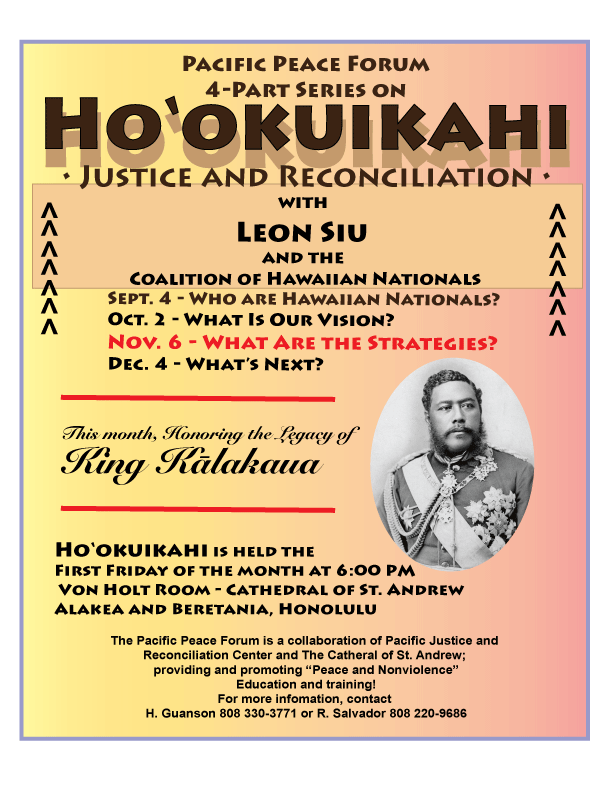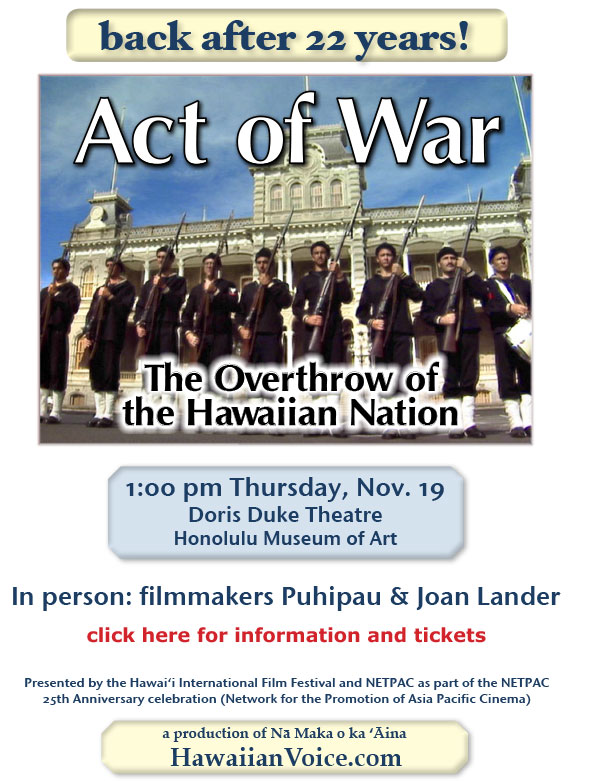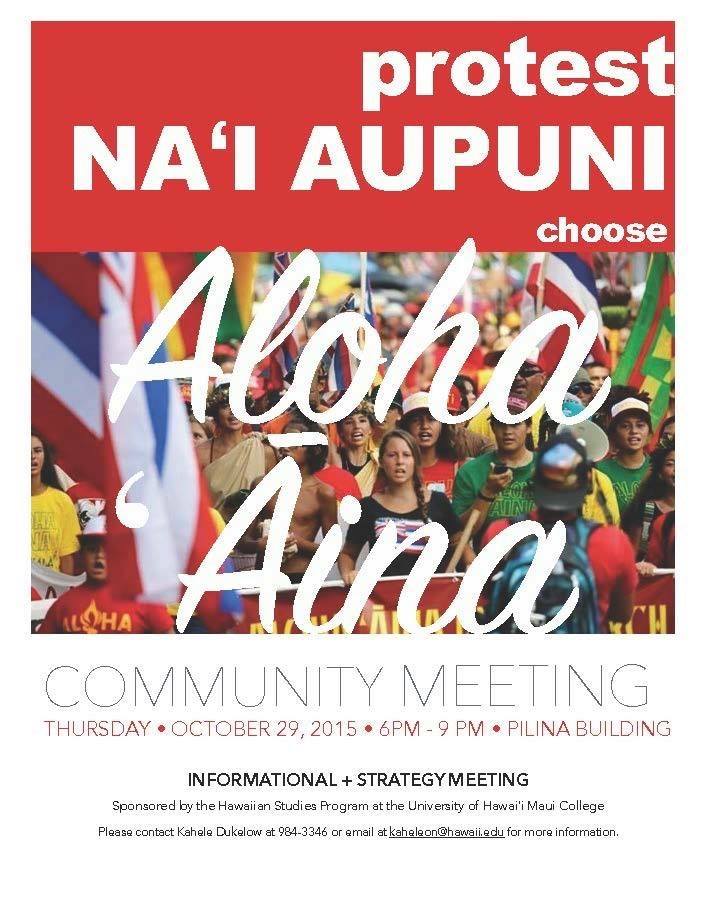This blog is about Hawaii's status as an independent country under prolonged illegal occupation by the United States, and the history, culture, law & politics of the islands.
By Scott Crawford, Hana, Maui
|
Blogs.com Top 10
Hawaii Blogs |
|
POSTPONED
Will repost when rescheduled…
The Hawaiian Nationals
Brainstorming Session
Sunday, November 15 from 6-8 PM
The Davies Room
The Cathedral of St. Andrew
(corner of Richards and Beretania)
Honolulu
From the Star-Advertiser
An election of Native Hawaiian delegates to a constitutional convention can go forward next month as planned, a federal judge ruled today.
U.S. District Court Judge J. Michael Seabright said he would not block the Na‘i Aupuni election, saying it was a private election not subject to public election laws.
A lawsuit filed in August argued that state is illegally supporting a race-based and view-based election, and an additional motion sought to halt the proceeding scheduled during the month of November.
One of the plaintiffs, Keli‘i Akina, president of the Grassroot Institute of Hawaii, said he plans to appeal the ruling to the 9th Circuit Court.
Voting for delegates begins November 1 for Hawaiians certified by the Native Hawaiian Roll Commission. Voting ends Nov. 30, with a constitutional convention planned to start in February.
Ian Lind in Civil Beat runs down the arguments on both sides in the federal court hearing today on the legality of the Na‘i Aupuni election process, and motion of preliminary injunction seeking to put the election on hold.
After four hours of legal arguments on Tuesday by supporters and opponents of the current election for delegates to a Native Hawaiian political convention that both sides agree could be an important step toward some form of Hawaiian self-governance, federal Judge J. Michael Seabright said he will decide by the end of the week whether he will block the election from proceeding.
Seabright is presiding over a lawsuit brought by several opponents of the process that is widely expected to be a significant step toward Hawaiian political autonomy. The lawsuit is backed by Judicial Watch, a conservative Washington foundation, and the lead plaintiff is Kelii Akina, CEO of the Grassroot Institute of Hawaii, a local conservative, free-market educational group.
Tuesday’s hearing was request by plaintiffs seeking a preliminary injunction that would put the election on hold until the issues being raised by the lawsuit can be decided. No trial date has yet been set, while ballots are due to be distributed to the list of certified voters on Nov. 1.
Seabright said he will rule on the injunction and scheduled another hearing for 10:30 a.m. Friday to explain the basis for it.
[…]
The election is opposed by Hawaiians on two ends of the political spectrum. Some Hawaiians like Akina, a political conservative, have opposed extending special status to Hawaiians. But the election process is also opposed by those Hawaiians who say they will not support anything less than full national independence. They also are against any process that would grant Hawaiians the same status as Native American tribal governments, which they see as limiting sovereignty.
[…]
Much of the legal wrangling during the hearing revolved around the issue of whether this election is truly a private affair among Hawaiians only, or whether its public funding and the participation of OHA, a state agency, mean that it is really a government function involving “state action” and subject to the constitutional protections against various forms of discrimination in voting and elections.
Darkness over Hawaii: The Annexation Myth Is the Greatest Obstacle to Progress
by Williamson Chang
Asian-Pacific Law & Policy Journal, Vol. 16.2, 2015
Abstract: To Delegates to the Hawaiian Convention to Establish a Governing Entity
Before moving ahead, Native Hawaiians must study and learn about the various forms of government throughout the world. Others around us know little about our real history. We, too, may not know our full history. We must gather more knowledge before making the momentous decisions which are the ostensible objectives of this convention. Justice Scalia, an extremely educated and esteemed constitutional scholar is an example of how little the world knows about the history of Hawai‘i.
Recent remarks by Justice Scalia reveal the extent and consequences of the campaign of deception asserting that Hawai‘i was acquired by joint resolution. This claim is not only false. It is impossible. The inability of a Joint Resolution to acquire the territory of the sovereign nation of Hawai‘i was emphatically pointed out during the Senate debate on the Joint Resolution in the summer of 1898.
Justice Scalia is not the only one deceived. The Hawai‘i Supreme Court, in a 2013 ruling on the effects of annexation, blithely ignored the most basic of all state laws—those describing the boundaries of Hawai‘i. Truth-telling through re-education of Native Hawaiians—and the rest of the world—is just beginning. One must not underestimate the tremendous ned for knowledge that must precede such an enormous task as nation-building.
Whether one supports restoration of the Kingdom or Tribal recognition, what Hawaiians need now is more scholarship about the world—particularly as to the world of newly emerging sovereign states and the history of decolonization. We should not let the current United States administration in Washington push us into tribal status. The path we take must be fully informed. Native Hawaiians must fully comprehend all the advantages and disadvantages of Federal Recognition as a Tribe.
“On September 12, 2015, eligible voters in the twenty-four districts of Hawai’i cast ballots in the country’s fifth governmental election since 1999.”
LHG 2015 Election Results (PDF)
The Hawaiian Kingdom as a Non-European Power
An interview of Dr. Keanu Sai and Ph.D. candidate Lorenz Gonschor by Dr. Lynette Cruz on Issues that Matter. The subject of the interview focused on the Hawaiian Kingdom as a non-European Power in the nineteenth century and its relationship with Japan.
Academics Dispelling the Myths of the Hawaiian Kingdom through Research
An interview of Professor Niklaus Schweizer and Ph.D. candidate Lorenz Gonschor from the University of Hawai‘i at Manoa by Kale Gumapac, host of the show The Kanaka Express. The interview is focuses on dispelling the untruths of the Hawaiian Kingdom that is a part of the research and classroom instruction at the University of Hawai‘i at Manoa.
Na‘i Aupuni (Native Hawaiian Convention): What it Is and What it’s Not
An interview of Dr. Keanu Sai by Kale Gumapac, host of the show The Kanaka Express. The interview focuses on Na‘i Aupuni or the Native Hawaiian Convention from a political science, historical and academic standpoint.
|
|





